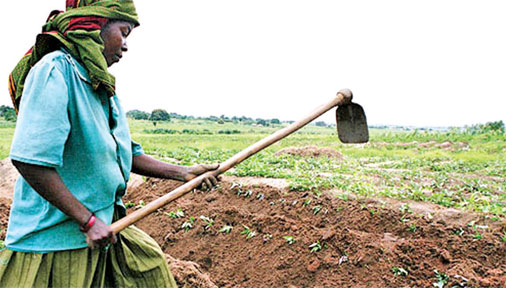Food price volatility, a growing concern - World Bank
Given the exceptional drought in the US, current crop conditions in
other grain producing regions, and the resulting increase in
international food prices, the World Bank has expressed concern for the
impact of this volatility on the world's poor, who are highly vulnerable
to increases in food prices.
When food prices rise sharply, families cope by pulling their
children out of school and eating cheaper, less nutritious food, which
can have catastrophic life-long effects on the social, physical, and
mental well being of millions of young people, said World Bank Group
President Jim Yong Kim. The World Bank and our partners are monitoring
this situation closely so we can help governments put policies in place
to help people better cope.”
“In the short-term, measures such as school feeding programs,
conditional cash transfers, and food-for-work programs can help to ease
pressure on the poor," said Kim. “In the medium- to long-term, the world
needs strong and stable policies and sustained investments in
agriculture in poor countries. We cannot allow short-term food-price
spikes to have damaging long-term consequences for the world's most poor
and vulnerable,” he said.
 Thus far, crop projections do not indicate the potential for actual
shortages in the major grains; however, stocks are low, and the harvests
will continue to be dependent upon global weather, which leaves prices
more vulnerable to higher volatility. Thus far, crop projections do not indicate the potential for actual
shortages in the major grains; however, stocks are low, and the harvests
will continue to be dependent upon global weather, which leaves prices
more vulnerable to higher volatility.
Food price volatility creates unpredictability in the market and
poses fundamental food security risks for consumers and governments.
Volatility also discourages investment in agriculture for development
due to increased financial risks and uncertainty for producers and
traders.
While the prices of many food staples have risen sharply, the Bank
said that the current conditions differ from the 2008 crisis. In 2008,
while other grains increased in price, rice and wheat prices rose the
most, although the price fell quite substantially in 2009 due to a
notable supply response by farmers seeking to benefit from higher
prices. In 2012, prices have risen across all the non-rice grains -
wheat, corn and soybeans:
*Wheat prices are up over 50 percent since mid-June;
*The price for corn has risen more than 45 percent since mid-June; and
*Soybeans are up almost 30 percent since the beginning of June and up
almost 60 percent since the end of last year.
In early June, analysts had expected price declines after the new
harvests, not spikes.
There had been early planting of corn and some soybeans in the United
States, and the disastrous drought was unpredictable at that stage.
Price increases will affect not only bread and processed food, but also
animal feed and ultimately the price of the meat.
In 2008, the price of rice more than tripled, which had a huge
negative impact on the poor, especially in Asia.
Although current rice prices remain at elevated levels, existing rice
stocks are relatively comfortable. In addition, current prices of crude
oil, fertilisers and international freight are at lower levels than in
2008, which will both ease the costs of importing food, and also the
sowing and growing of next season's crop.
The impact of the U.S. drought on global markets is exacerbated by
other countries also currently suffering from weather-related production
issues. Almost continuous rain is causing problems for the wheat crop in
many European countries, whereas the wheat crops in Russia, Ukraine and
Kazakhstan have been hit hard by a lack of rain.
In India, monsoon rainfall is about 20 percent below the long-term
annual average. July is the critical planting month and there may be
major negative implications if rains do not pick up.
Should the current situation escalate, the World Bank Group stands
ready to assist client countries through measures such as increased
agriculture and agriculture-related investment, policy advice,
fast-track financing, the multi-donor Global Agriculture and Food
Security Program, and risk management products.
"We are also coordinating with UN agencies through the High-Level
Task Force on the Global Food Security Crisis and with non-governmental
organisations, as well as supporting the Partnership for Agriculture
Market Information System (AMIS) to improve food market transparency and
to help governments make informed responses to global food price spikes.
The World Bank has long cautioned that we can expect to see volatile,
higher than average grain prices until at least 2015. In the poorest
countries, where people spend up to two-thirds of their daily income on
food, rising prices are a threat to global growth and social stability.
However, higher prices can bring desperately needed income to poor
farmers, enabling them to invest, increase their production and thereby
become part of the global food security solution.
There are nearly one billion hungry people worldwide. More than 60
percent of the world's hungry are women. Malnutrition contributes to
infant, child and maternal illness; decreased learning capacity; lower
productivity and higher mortality. One-third of all child deaths
globally are attributed to under-nutrition, and up to 80 percent of
our brain architecture develops during the first 1,000 days of life,
making access to nutritious food critical, particularly for young
children.
|

